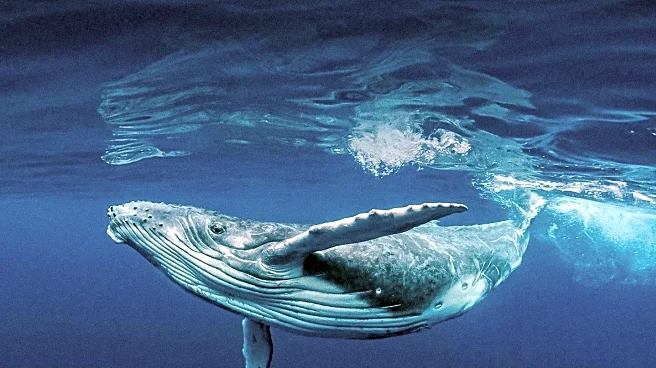What's Happening?
Recent research has uncovered the remarkable DNA repair capabilities of the bowhead whale, which may hold the key to advancing cancer research and treatment. The study, published in Nature, reveals that the whale's cells possess an exceptional ability
to repair damaged DNA, particularly double-strand breaks, which are among the most dangerous forms of genetic damage. This ability is attributed to the high quantities of cold-inducible RNA-binding protein (CIRBP) found in whale cells. When CIRBP was overexpressed in human cells, it significantly improved DNA repair accuracy, reduced chromosomal abnormalities, and slowed malignant transformation. These findings suggest that CIRBP's function in protecting DNA integrity could be an evolutionarily conserved mechanism contributing to longevity and cancer resistance.
Why It's Important?
The implications of this study are profound for cancer research and treatment. Current therapies often focus on destroying cancer cells, which can also harm healthy tissue. Insights from the bowhead whale suggest a new approach that strengthens the body's ability to repair DNA, potentially preventing malignant mutations from forming. This could revolutionize preventive oncology, especially for individuals with genetic vulnerabilities or age-related decline in repair capacity. Additionally, understanding CIRBP's function could lead to therapies that reduce cancer risk without compromising normal cell function, offering a blueprint for protecting human cells from mutation and aging.
What's Next?
Future research may focus on identifying compounds that enhance CIRBP-like activity or stabilize DNA repair pathways, potentially leading to therapies that reduce cancer risk. The study also opens the door to exploring environmental or lifestyle-based interventions that could stimulate similar molecular responses in humans. As populations age, the burden of diseases linked to DNA damage continues to rise, and the bowhead whale's biology may inspire medical science to redefine aging as a condition that can be managed by protecting cellular integrity.
Beyond the Headlines
The study introduces a new biological model that bridges molecular biology, oncology, and geroscience. It challenges the traditional view of aging as inevitable decline, suggesting that sustaining genome integrity is biologically possible. The whale's alternative strategy of repairing rather than removing damaged cells preserves cell function while maintaining genome stability, a balance that could be key to both longevity and cancer resistance.















